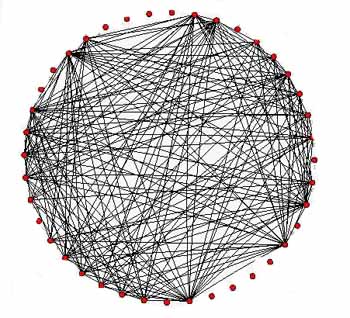 It is one of my favourite times of year, and I'm not even European.
It is one of my favourite times of year, and I'm not even European.The Eurovision Song Contest to Australians is a strange mix of bad 80's music, songs about "joy", "love" and "unity" (it's a good drinking game to take a shot every time one of those words are said), amazingly good looking hosts with amusing English skills, scantily dressed Eastern Europeans and reality TV winners from Western Europe. For the first time in my life, living in the UK I get a chance to vote for the winner and watch it live instead of having to ignore radio reports (of course it's all over the news) till the Sydney Sunday evening replay.
The voting of Eurovision is a complex interaction of politics and voting blocks. Each country votes in a popular vote, in which they can not vote for themselves, and each country has equal voting power. The voting is often based on politics and the whole system is a complex interaction of objects (countries) who interact with each other by giving each other points. A statistical analysis of the system can then give some insight in the nature of the interactions. For example, it can show whether certain countries form cliques that always vote similarly, or whether a country's voting is "in tune" with that of the whole group.
A team of Oxford scientists recently performed statistical tests on data from between 1992 and 2003 to uncover what is behind the voting. The team simulated a "random song contest", in which each country assigns its points randomly to 10 other countries, and compared these results to the actual data. One of their tests looked at voting relationships over time. If, for example, country A gives and/or receives points from another country B over a long period of time, then we can deduce that in some way the musical tastes of the two countries are related. Carrying out the same analysis between country A and all other countries in turn will show whether country A thinks the same as the rest of Europe.
One of their tests looked at voting relationships over time. If, for example, country A gives and/or receives points from another country B over a long period of time, then we can deduce that in some way the musical tastes of the two countries are related. Carrying out the same analysis between country A and all other countries in turn will show whether country A thinks the same as the rest of Europe.
Another test observes the number of countries to which a given country A has awarded points and from which it has also received points. If a country has many such "reciprocal links", then one might deduce that its musical taste harmonises well with that of Europe in general. They also tested whether the ways countries voted could be correlated with each other. They looked at whether two countries that have both received and/or awarded points to a third country are likely to give or receive points from each other.
And the results? The UK is in tune with the rest of Europe, while France is a slight outsider. The cliques that were uncovered were Greece and Cyprus, the UK and Ireland, and the Nordic countries. Also, more surprising pairings such as Croatia and Malta, which are not geographically close, were found.
Read more in the Plus article United Kingdom - twelve points, and don't forget to vote!
Listen to this show here (with small, less than 10%, Eurovision music clips - yes I own some Eurovision albums....)












Just did a seach of your blog and realised that Ben Folds is mentioned more than I am. Talk about outrageous.
ReplyDeleteIf you let me know who you are, I can mention you some more!
ReplyDeleteit's me, fool.
ReplyDelete